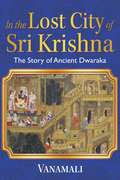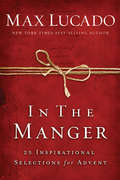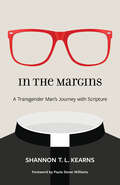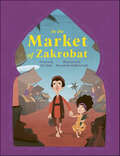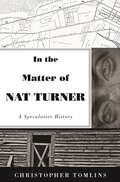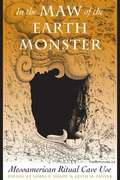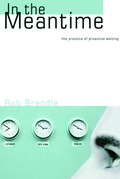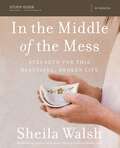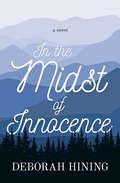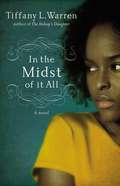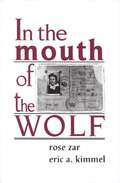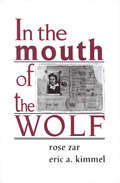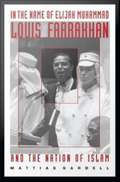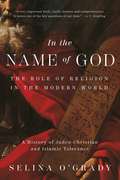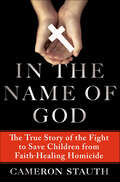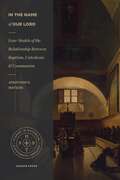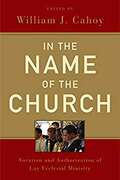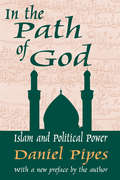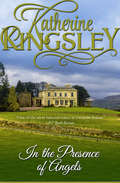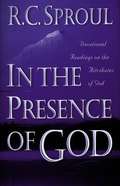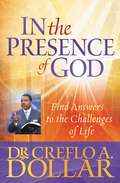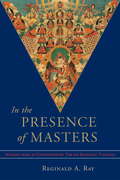- Table View
- List View
In the Lost City of Sri Krishna: The Story of Ancient Dwaraka
by VanamaliA vivid journey back to the time of Krishna, his holy city, and the Mahabharata War • Recounts ecstatic celebrations, Krishna’s love for his wives and sons, and events surrounding the Mahabharata War • Offers potent spiritual lessons from Krishna’s teachings and stresses Krishna’s ability to contain all opposites and stand above duality • Provides a historical timeline and real dates for the Mahabharata War and the sinking of Krishna’s city beneath the sea Located on the west coast of India in the state of Gujarat, the city of Dwaraka is considered one of the seven holy cities of India. Archaeological discoveries of ruins and artifacts off the city’s coast have now conclusively proven what many have long believed: Modern Dwaraka is built on the same site as the famed city of the same name from the Puranas and the Mahabharata, the “Golden City” of Lord Krishna. Transporting us back five thousand years to the time of Krishnavatara, the age in which Krishna lived, Vanamali leads us on a journey alongside Lord Krishna as he reigns over the ancient port city of Dwaraka and helps the Pandavas through the Mahabharata War. Recounting ecstatic celebrations, Krishna’s love for his wives and sons, and events surrounding the epic war, the author stresses Krishna’s ability to contain all opposites and stand above duality like a lotus leaf floating on a running stream. Offering potent spiritual lessons throughout her story, she shows how the truly spiritual individual is able to unreservedly accept all dimensions of life and rise above all dualities of existence, war and peace, love and hate, sex and abstinence, action and meditation. She also provides a historical timeline for the Mahabharata War and the sinking of Krishna’s city beneath the sea--3126 BCE and 3090 BCE, respectively--and shows how the Mahabharata War occurred under circumstances quite similar to those of the present day, both politically and astrologically. Through her vivid tale and her personal connection with Krishna across many lifetimes, Vanamali shows how the magic and mystery of Krishna’s ancient holy city live on through his spiritual teachings.
In the Manger: 25 Inspirational Selections for Advent
by Max LucadoThe greatest mind in the universe imagined time. The truest judge granted Adam a choice. But it was love that gave Immanuel, God with us.The Author would enter his own story. The Word would become flesh. He, too, would be born. He, too, would be human. He, too, would have feet and hands, tears and flesh.Witness the birth of Christ as you've never seen it before. Through twenty-five inspirational selections from the works of bestselling author Max Lucado, join Mary and Joseph inside a stable, beside a shepherd, at the feet of the King. Immanuel in the manger.
In the Margins: A Transgender Man's Journey with Scripture
by Shannon T. KearnsMoving the conversation beyond transgender inclusion to demonstrate the unique and vital theological insights transgender Christians can provide the church. Father Shannon Kearns is familiar with liminal spaces. He&’s lived in them his whole life. And while his experience as a transgender man has often made it difficult for him to fit in—especially in the context of Christianity—it has also shaped his perspective in important ways on complicated, gender-transgressing aspects of theology and Scripture. In the Margins weaves stories from Shannon&’s life into reflections on well-known biblical narratives—such as Jacob wrestling with the divine, Rahab and the Israelite spies, Ezekiel and the dry bones, and the transfiguration of Jesus. In each chapter, Shannon shows how stories have helped him make sense of his own identity, and how those same stories can unlock the transformative power of faith for those willing to listen with an open mind and stand alongside him in the in-between.
In the Market of Zakrobat
by Ori ElonBaltosar lives in a giant fortress in the town of Zakrobat. Despite owning thirteen boxes of gold, he prides himself on how frugally he lives. Yosef, Baltosar’s neighbour, is a hardworking cobbler who lives in poverty. Yet, every Friday, he goes to the market to buy something special for Shabbat. Yosef is famous for his festive Shabbat meals. One night, Baltosar dreams that his boxes of gold grow feet and run away to Yosef. He wakes up screaming in terror and vows that Yosef will never have a penny of his great fortune. He comes up with the perfect scheme to keep his riches safe, or at least safe from Yosef, but things don’t quite go according to plan. Told with humour and a lightness of touch, this classic fable of a miser’s comeuppance celebrates generosity of spirit and the joy of Shabbat as all the riches a person needs.
In the Matter of Nat Turner: A Speculative History
by Christopher TomlinsA bold new interpretation of Nat Turner and the slave rebellion that stunned the American SouthIn 1831 Virginia, Nat Turner led a band of Southampton County slaves in a rebellion that killed fifty-five whites, mostly women and children. After more than two months in hiding, Turner was captured, and quickly convicted and executed. In the Matter of Nat Turner penetrates the historical caricature of Turner as befuddled mystic and self-styled Baptist preacher to recover the haunting persona of this legendary American slave rebel, telling of his self-discovery and the dawning of his Christian faith, of an impossible task given to him by God, and of redemptive violence and profane retribution.Much about Turner remains unknown. His extraordinary account of his life and rebellion, given in chains as he awaited trial in jail, was written down by an opportunistic white attorney and sold as a pamphlet to cash in on Turner’s notoriety. But the enigmatic rebel leader had an immediate and broad impact on the American South, and his rebellion remains one of the most momentous episodes in American history. Christopher Tomlins provides a luminous account of Turner's intellectual development, religious cosmology, and motivations, and offers an original and incisive analysis of the Turner Rebellion itself and its impact on Virginia politics. Tomlins also undertakes a deeply critical examination of William Styron’s 1967 novel, The Confessions of Nat Turner, which restored Turner to the American consciousness in the era of civil rights, black power, and urban riots.A speculative history that recovers Turner from the few shards of evidence we have about his life, In the Matter of Nat Turner is also a unique speculation about the meaning and uses of history itself.
In the Maw of the Earth Monster: Mesoamerican Ritual Cave Use
by James E. Brady Keith M. PruferAs portals to the supernatural realm that creates and animates the universe, caves have always been held sacred by the peoples of Mesoamerica.<P><P> From ancient times to the present, Mesoamericans have made pilgrimages to caves for ceremonies ranging from rituals of passage to petitions for rain and a plentiful harvest. So important were caves to the pre-Hispanic peoples that they are mentioned in Maya hieroglyphic writing and portrayed in the Central Mexican and Oaxacan pictorial codices. Many ancient settlements were located in proximity to caves. This volume gathers papers from twenty prominent Mesoamerican archaeologists, linguists, and ethnographers to present a state-of-the-art survey of ritual cave use in Mesoamerica from Pre-Columbian times to the present. Organized geographically, the book examines cave use in Central Mexico, Oaxaca, and the Maya region. Some reports present detailed site studies, while others offer new theoretical understandings of cave rituals. As a whole, the collection validates cave study as the cutting edge of scientific investigation of indigenous ritual and belief. It confirms that the indigenous religious system of Mesoamerica was and still is much more terrestrially focused that has been generally appreciated.
In the Meantime: The Practice of Proactive Waiting
by Rob BrendleYou're young? Check. You've felt God's tap on the shoulder, like he's got something for you to do with your life? Right. But you're not exactly sure what it is, or how to get there? Exactly. If that's you, then here's a great guide to help you find your way to whatever it is God has for you in life. You may be surprised to learn that a very famous person in the Bible found himself in a similar place. David was just watching some sheep, but God made it clear he was destined to do something a bit more meaningful and important--David was going to be king. As a young man he had to learn how to "live into" his calling-become like a king before ever putting on the crown. You probably won't be joining the royal family any time soon. But you can still learn a lot about life--your life, your destiny--by taking a good look at David's life. David had a dream and caught a glimpse of his purpose. He just didn't know how to realize it, how to live until he did, and how to wait for it proactively. Maybe that's you, too. In this amusing, amazing, and very surprising guidebook, Rob Brendle can help you get there from here.
In the Middle of the Mess Study Guide: Strength for This Beautiful, Broken Life
by Sheila WalshThe trials we face in this life can feel overwhelming. Life often seems broken—shattered into a million pieces—and at times we may wonder if our mess is “too big” for God. We can convince ourselves we are too far away from God’s grace for it to reach us where we are.Sheila Walsh knows this feeling all too well—and the hiding and shame that result from it. But in this six-session video study, she shows how using spiritual disciplines such as confession, prayer, and meditation on Scripture helped her break free from this cycle of despair and experience newfound joy as a child of God—fully known, fully loved, and fully accepted. She reveals that while we will never be completely “fixed” on earth, God’s power can be made perfect in our weakness. He is waiting to accept us—having already promised to love us, heal us, and carry us through to the end. Our brokenness can be the beginning of something beautiful, and accepting the fact that we are broken can be the key to finding God’s strength in the middle of the mess.This study guide includes video discussion questions, Bible exploration, and in-between session study materials that will help you practice the spiritual discipline Sheila is discussing each week as she leads you and your group members through the journey of brokenness.Sessions include:Brokenness Is the BeginningBrokenness Is HardBrokenness Is LoudBrokenness Is to Be SharedBrokenness Is the Path to HealingBrokenness Is TemporaryDesigned for use with the In the Middle of the Mess Video Study (sold separately).
In the Middle of the Mess: Strength for This Beautiful, Broken Life
by Sheila Walsh Kay WarrenHow do you turn your struggles into strengths? Beloved Bible teacher Sheila Walsh teaches readers how the daily spiritual practices of confession, meditation on God’s Word, and prayer result in fresh freedom in Christ.In her long-awaited new book, Sheila Walsh equips women with a practical method for connecting with God’s strength in the midst of struggle. From daily frustrations that can feel like overwhelming obstacles to hard challenges that turn into rock-bottom crises, women will find the means to equip themselves for standing strong with God. Using the spiritual applications of confession, prayer, and meditation on Scripture to form a daily connection to Jesus, women will learn how to experience new joy as a child of God who is fully known, fully loved, and fully accepted. In In the Middle of the Mess, Walsh reveals the hardened defenses that kept her from allowing God into her deepest hurts and shares how entering into a safe place with God and practicing this daily connection with him have saved her from the devil’s prowling attacks. Though we will never be completely “fixed” on earth, we are continually held by Jesus, whatever our circumstances.
In the Midst of Innocence
by Deborah Hining"An endearing ballad of the struggle for existence and understanding." –Booklist Ten-year-old Pearl Wallace is living in the mountains of rural Tennessee in the depths of the Great Depression and several years into Prohibition. Pearl struggles with her moral dilemmas: What can she do to protect her best friend Darlene from an abusive stepfather? And, especially, how much does she need to tithe on the money she has earned from stealing her daddy’s moonshine and selling it? Meanwhile, Emily Weston, a missionary, has come to “lift the poor hillbillies of the region out of their ignorance and misery.” Coming from a place of affluence and privilege, she is quickly overwhelmed by the social and racial issues facing her students and their families. When murder, fire, and heartbreak threaten those they love, Pearl and Emily must confront the hate and bigotry of their neighbors. Emily’s time in the mountains will be one not of saving souls, but of personal reckoning.
In the Midst of It All: A Novel
by Tiffany L. WarrenAll her life, Zenovia has struggled with the burden of caring for her schizophrenic mother, Audrey, alone. Until one day, God seems to offer support in the form of two members of a church called the Brethren of the Sacrifice, who knock at the women's door preaching an unconventional version of the Gospel. Despite having questions, Zenovia agrees to join the church along with her mother. Soon afterward, Audrey stops taking her medication when fellow churchgoers deem her illness a demonic possession. Unable to watch her mother's mental deterioration, Zenovia flees town, only to receive a fateful phone call several years later telling her of her mother's suicide. Heartbroken, Zenovia must now make a soul-altering choice: accept "God's will," or return home to confront the demons she's worked so hard to leave behind....
In the Mouth of the Wolf
by Eric A. Kimmel Rose ZarRose Zar was 19 years old when the Nazis invaded her native Poland. Her father urged her to save herself by hiding "in the mouth of the wolf"--or within the enemy itself. She managed to obtain false papers, secretly changing her identity to that of a Catholic Pole and surviving the Holocaust, staying in Poland, as maid and nanny for a Nazi SS colonel.
In the Mouth of the Wolf
by Eric A. Kimmel Rose ZarRose Zar was 19 years old when the Nazis invaded her native Poland. Her father urged her to save herself by hiding “in the mouth of the wolf”—or within the enemy itself. She managed to obtain false papers, secretly changing her identity and surviving the Holocaust as maid and nanny for a Nazi SS colonel.
In the Name of Elijah Muhammad: Louis Farrakhan and the Nation of Islam
by Mattias GardellIn the Name of Elijah Muhammad tells the story of the Nation of Islam--its rise in northern inner-city ghettos during the Great Depression through its decline following the death of Elijah Muhammad in 1975 to its rejuvenation under the leadership of Louis Farrakhan. Mattias Gardell sets this story within the context of African American social history, the legacy of black nationalism, and the long but hidden Islamic presence in North America. He presents with insight and balance a detailed view of one of the most controversial yet least explored organizations in the United States--and its current leader. Beginning with Master Farad Muhammad, believed to be God in Person, Gardell examines the origins of the Nation. His research on the period of Elijah Muhammad's long leadership draws on previously unreleased FBI files that reveal a clear picture of the bureau's attempts to neutralize the Nation of Islam. In addition, they shed new light on the circumstances surrounding the murder of Malcolm X. With the main part of the book focused on the fortunes of the Nation after Elijah Muhammad's death, Gardell then turns to the figure of Minister Farrakhan. From his emergence as the dominant voice of the radical black Islamic community to his leadership of the Million Man March, Farrakhan has often been portrayed as a demagogue, bigot, racist, and anti-Semite. Gardell balances the media's view of the Nation and Farrakhan with the Nation's own views and with the perspectives of the black community in which the organization actively works. His investigation, based on field research, taped lectures, and interviews, leads to the fullest account yet of the Nation of Islam's ideology and theology, and its complicated relations with mainstream Islam, the black church, the Jewish community, extremist white nationalists, and the urban culture of black American youth, particularly the hip-hop movement and gangs.
In the Name of God: The Role of Religion in the Modern World: A History of Judeo-Christian and Islamic Tolerance
by Selina O'GradyA groundbreaking book on the history of religious tolerance and intolerance that offers an essential narrative to understanding Islam and the West today.Never has this book been more timely. Religious intolerance, the resurgence of fundamentalism, hate crimes, repressive laws, and mass shootings are pervasive in today&’s world. Selina O&’Grady asks how and why our societies came to be as tolerant or intolerant as they are; whether tolerance can be expected to heal today&’s festering wound between Islam and the post-Christian West; or whether something deeper than tolerance is needed. From Umar, the seventh century Islamic caliph who led what became the greatest empire the world has ever known, to King John (of Magna Carta fame) who almost converted to Islam; from Ibn Abd al-Wahhab, who created the religious-military alliance with the House of Saud that still survives today, to the bloody Thirty Years&’ War that cured Europe of murderous intra-Christian violence (but probably killed God in the process), Selina O&’Grady takes the reader through the intertwined histories of the Muslim, Christian, and Jewish faiths. In the Name of God is an original and thought-provoking history of monotheistic religions and their ever-shifting relationship with each other.
In the Name of God: The True Story of the Fight to Save Children from Faith-Healing Homicide
by Cameron StauthAn anonymous caller tells a detective in a small Oregon town that a woman has just bitten off a man's finger. But the man is not the victim, the caller says. The woman is. She's being held against her will by a group of faith-healing fanatics who are trying to cure her depression with violent exorcisms.The detective rescues her, but she is afraid to press charges against the people in her church. Then the detective gets an even more ominous message: Children in the church have been dying mysteriously for years, and now several more are in immediate peril, facing blindness, disability, and death.Unwilling to stand by and allow more children to suffer, the anonymous caller -- a church insider -- risks everything to work with three detectives and a lone prosecutor to fight faith-based child abuse, and to change the laws that protect its perpetrators. They are joined by a mother who'd suffered a faith-healing tragedy herself, and afterwards dedicated her life to saving others from the same fate.Masterfully written by author Cameron Stauth, In the Name of God tells the true story of their heroic mission, which resulted in a historic series of sensational trials that exposed the darkest secret of American fundamentalism, and revealed the shameful political deals that have allowed thousands of children to die at the hands of their own parents -- legally.Though the battle against faith-healing abuse continues around the country, the victory in Oregon has lit the path to a better future, in which no child need die because of a parent's beliefs.
In the Name of Jesus: Reflections on Christian Leadership
by Henri J. M. NouwenHenri Nouwen undertakes to talk about Christian leadership and provides a profile in stark contrast to worldly values. His ideal leader is a praying leader, a vulnerable leader, a trusting leader, one who voluntarily chooses a life of downward mobility.
In the Name of Osama Bin Laden Global Terrorism and the Bin Laden Brotherhood
by Roland JacquardOne view of the Bin Laden Brotherhood.
In the Name of Our Lord: Four Models of the Relationship Between Baptism, Catechesis, and Communion (Studies in Historical and Systematic Theology)
by Jonathan D. WatsonWho is a member of the church? Christians divide on how one enters the church body. Matters are quickly complicated once other factors are considered, such as faith, instruction, baptism, first communion, and formal membership. Who should be baptized? What role does instruction play? And what is the best order of these things? Jonathan D. Watson's In the Name of Our Lord provides an explanatory typology and incisive analysis for thinking through these interrelated questions. Watson's four--model framework accounts for the major historical varieties of relationship between baptism and catechesis as initiation into the church. With this framework in place, Watson then considers each model in relation to one another. With a guide to navigating the terrain, readers can comprehend, compare, and contrast these different theological formulations. Readers will have a sophisticated but clear system for thinking through foundational matters that are important to every pastor and congregant.
In the Name of the Church: Vocation and Authorization of Lay Ecclesial Ministry
by William John CahoyIn the Name of the Church: Vocation and Authorization in Lay Ecclesial Ministry presents insights generated in the 2011 Collegeville National Symposium on Lay Ecclesial Ministry, a gathering designed to prioritize the theological foundations for vocation and authorization in lay ecclesial ministry, and make recommendations to advance excellence in this expanding ministry. The essays presented by seven theologians at the Symposium are included, along with thoughtful input drawn from the experiences of lay and ordained ministers who gathered to amplify the voice and strengthen the national will to promote effective ecclesial leadership practices identified within Co-Workers in the Vineyard of the Lord.
In the Path of God: Islam and Political Power
by Daniel PipesAmericans' awareness of Islam and Muslims rose to seemingly unprecedented heights in the immediate aftermath of September 11, 2001, but this is not the first time they have dominated American public life. Once before, during the period of the Iranian revolution and hostage crisis of 1979 to 1981, Americans found themselves targeted as a consequence of a militant interpretation of Islam. Daniel Pipes wrote In the Path of God in response to those events, and the heightened interest in Islam they generated. His objective was to present an overview of the connection between in Islam and political power through history in a way that would explain the origins of hostility to Americans and the West. Its relevance to our understanding of contemporary events is self evident. Muslim antagonism toward the West is deeply rooted in historical experience. In premodern times, the Islamic world enjoyed great success, being on the whole more powerful and wealthier than their neighbors. About two hundred years ago, a crisis developed, as Muslims became aware of the West's overwhelming force and economic might. While they might have found these elements attractive, Muslims found European culture largely alien and distasteful. The resulting resistance to Westernization by Muslims has deep roots, has been more persistent than that of other peoples, and goes far to explain the deep Muslim reluctance to accept modern ways. In short, Muslims saw what the West had and wanted it too, but they rejected the methods necessary to achieve this. This, the Muslim trauma, has only worsened over the years.
In the Presence of Angels
by Katherine KingsleyFrom the national bestselling author, a Regency &“filled with the strong spirituality that has become a hallmark of Ms. Kingsley&’s romances&” (Romantic Times). Louisa Merriem is in danger of losing her farm after her husband dies in the war at Waterloo. When she places an ad looking for help, she never expects someone as handsome and mysterious as Will Cutter to arrive on her doorstep. Unsure of whether this stranger is trustworthy, Louisa is left with little choice if she wants to save her farm. Mistaken for a common worker, Maj. Lord William Fitzpatrick doesn&’t know how to confess his identity to Louisa, the widow of his best friend and comrade in arms. Despite falling in love with her after reading the letters she&’d sent her husband, he means only to pay his respects. But committed now to saving her farm, he wants more than just her trust, hoping the vulnerable widow will learn to love again. &“This beautiful romance, obviously written from the heart, will have you believing in love . . . and the presence of angels.&” —Old Book Barn Gazette &“An emotionally stirring Regency romance that reaches deep-down inside and touches the reader&’s soul.&” —Stardust &“Sprinklings&” of Romance
In the Presence of God
by R. C. SproulNow in Trade Paper! Theologian R.C. Sproul has the unique ability to take difficult Christian concepts and make them both fascinating and personal. In his first devotional, this popular author provides an intimate portrait of God's numerous attributes. In The Presence of God is divided into 15 sections, based on 15 distinct attributes of God that teach us how we can live more fully as children of God. Each brief reading contains a Scripture verse and a message of encouragement and wisdom from the pen of R.C. Sproul. If you're spiritually hungry for a devotion of substance, let R.C. Sproul take you In the Presence of God. Topics include: Knowing God Meeting with God Facing Life's Challenges with God Discerning God's Will Experiencing God's Best
In the Presence of God: Find Answers to the Challenges of Life
by Creflo A. DollarWhether the need is for physical or emotional healing, a financial breakthrough, the strength to overcome temptation, or restoration of a relationship, every good gift from the loving, heavenly Father is found by coming into His presence. Dr. Dollar shows readers how to come into the presence of God and hear direction through prayer and digging into His Word. Readers will learn: <BR>- To build a burning desire for God in their life<BR>- To be bold enough to take God at His Word and receive His blessings by faith<BR>- To live a lifestyle of praise and thanksgiving<BR>- To refuse to allow fear and doubt to rob them of their blessings<BR>- To be a blessing to others<BR>- Dr. Dollar brings hope to millions of believers who are searching for answers. They will discover the method to finding answers to the many questions of their life.<BR>- This much sought after message is complemented by an interactive study guide making this book perfect for small groups, Sunday school classes, and personal study.<BR>- As a gifted communicator, Dr. Dollar's writing style is personal, practical, and humorous, appealing to people from all walks of life.
In the Presence of Masters: Wisdom from 30 Contemporary Tibetan Buddhist Teachers
by Reginald A. RayThirty of the most creative, eloquent, and energetic Tibetan Buddhist teachers of Westerners in recent decades are featured in this collection of teachings that are certain to be highly treasured by all students of Buddhism. The contributors are masters who helped establish Buddhism in the West, founding centers in North America, Great Britain, Australia, and Europe; publishing books in English; and gaining recognition among Western Buddhists. Their teachings, drawn exclusively from the spoken word as given in talks and seminars, convey the directness and power for which the oral tradition is so valued in Buddhism. The book highlights the teachings of the practice lineages, the branch of Tibetan Buddhism that emphasizes meditation practice, personal experience, and spiritual realization. Selections are thematically organized, including topics such as the major approaches to the spiritual path, meditation and other practices, Buddhist ethics, tantric practice, and the role of the teacher. Includes the following teachers: Chagdud Tulku Rinpoche * Chögyam Trungpa Rinpoche * Chökyi Nyima Rinpoche * Deshung Rinpoche * Dilgo Khyentse Rinpoche * Drubwang Tsoknyi Rinpoche * Dudjom Rinpoche * Dzigar Kongtrul Rinpoche * The Dzogchen Pönlop Rinpoche * Dzongsar Khyentse Rinpoche * Gen Lamrimpa * The Third Jamgön Kongtrul Rinpoche * Kalu Rinpoche * Venerable Khandro Rinpoche * Khenpo Könchog Gyaltsen * Khenpo Tsultrim Gyamtso Rinpoche * Lama Lodö * Lama Thubten Yeshe Rinpoche * Namkhai Norbu Rinpoche * Nyoshul Khenpo Rinpoche * Ringu Tulku Rinpoche * Sakyong Mipham Rinpoche * Sogyal Rinpoche * Tarthang Tulku Rinpoche * Thinley Norbu Rinpoche * Thrangu Rinpoche * Traleg Kyabgon Rinpoche * Tulku Thondup Rinpoche * Tulku Urgyen Rinpoche * Lama Zopa Rinpoche
